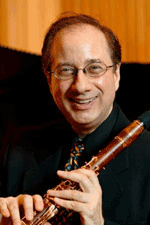> [Archived] Interviews

Interview with clarinettist Charles Neidich
American Charles Neidich is one of the world's best contemporary concert clarinettists. He pays particular interest to his own style (he has a very interesting version and discourse of Mozart's Concerto in A Major for Clarinet and Orchestra), and Charles Neidich is a veteran of the Moritzburg Chamber music Festival, where he played several chamber works by Johannes Brahms in 2010.
Music speaks for itself, but the Brahms that people will hear will be a very appassionato one, also they will hear a wonderful flow from one theme to another. The most beautiful and interesting thing about, for example: in Trio op.114, is that the end of each phrase is the start of the next one. It's something clearly stated in the music, in the score, if you look carefully, you will see that the end and the beginning is the same.
What is the performer's role in music?
Music cannot exist without the performer, just like in theatre, the author writes something on paper, which is more like plan, but the performer is the one who carries out the plan, the one who fulfils it. I know this because I also write and play. Sometimes I compose only for myself; it's fascinating to play my own work and realize it speaks in a new way, even though I wrote it myself. If you look back in history, you can see great composers were also great players, and so was Brahms, he was spontaneous and flexible. His style was known for his wonderful rubato. Sometimes he played so freely, that his friend and life mate, Carla Schumann, would tell him to pay attention to his stage partners, because he sometimes played unusual things that made it hard for others to keep up with him. So, as you can see, as a performer, he would also find something new in his music.
You played all around the world, so you must have a view on the way things are changing… Maybe Asia will be the next world power…
Indeed, Asia will undoubtedly be the future cultural centre. I spend more and more time in Asia, for example I came to Moritzburg straight from Japan, where I taught a two weeks course. I had students there not only from Japan, but also China, Korea and Thailand. We can see an enormous energy coming from China, especially from youngsters, who are very passionate about Western European music.
Where does Europe belong in this picture?
Europe is still very important and it will still be in the future, first of all, because the public is more sophisticated, more educated. In China for example, there are musicians, especially young ones, but no cultural scene where they can perform. That's why they look towards Europe or America, and other places, to complete their studies and develop their career.
Do you have any connections with Romanian musicians?
I know a few names, unfortunately though, I've never been to Romania, even though I was nearby sometimes. I do play a Tiberiu Olah piece, Sonata for Clarinet solo, which in the last twenty years has become a standard in a clarinet repertoire, and I make sure that all my students learn it and it has become a popular and important piece for clarinet.
Translated by Tudor - Alexandru Ciocănel
MA Students, MTTLC Student, Bucharest University














